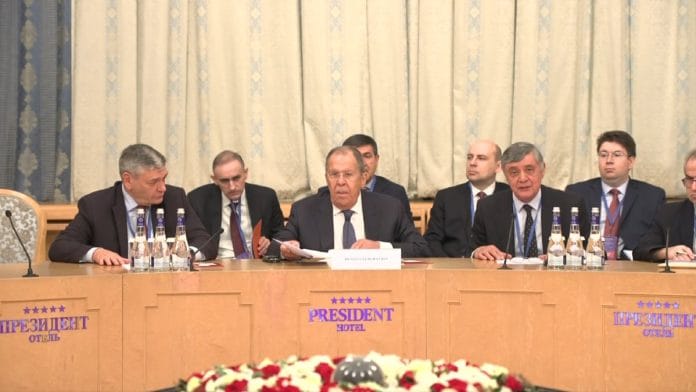New Delhi: India, Russia, China and a number of other countries including Pakistan and Iran Tuesday jointly opposed the US’s demand of the return of Bagram air base in Afghanistan to its control.
“They [countries present at the Moscow Format] called unacceptable the attempts by countries to deploy their military infrastructure in Afghanistan and neighboring states, since this does not serve the interests of regional peace and stability,” read the joint statement published by the Russian foreign ministry.
US President Donald J. Trump during a joint press briefing with UK Prime Minister Keir Starmer last month said that he “wants” the Bagram air base back. Days later he promised that “bad things will happen” if the Taliban did not return the air base. The Soviet-era air base was set up by Moscow in the 1950s as a part of its Cold War presence in the Central Asian nation.
Bagram became the largest US air base in Afghanistan after its military seized it during its ‘war on terror’ in 2001.
Its strategic location, close to China’s Xinjiang province, may have also played a role in Trump demanding its return. The Taliban has so far rejected any prospect of a foreign military outpost in Afghanistan.
The seventh Moscow Format Consultations on Afghanistan was hosted on 7 October in Moscow. For the first time the acting foreign minister, Amir Khan Muttaqi, represented the Taliban regime that has been in power in Kabul since August 2021. Muttaqi met with Russian foreign minister Sergey Lavrov. India was represented by its Ambassador to Russia Vinay Kumar.
The Moscow format was established in 2017, and consists of representatives from India, Iran, Kazakhstan, China, Kyrgyzstan, Pakistan, Russia, Tajikistan and Uzbekistan.
The countries “reaffirmed” their support for the “establishment of Afghanistan as an independent, united and peaceful state. Adding, “The parties noted the need for development of economic and trade exchanges, investment cooperation of Afghanistan with regional countries and the international community. They expressed their interest in developing regional economic projects with Afghan participation.”
Representatives present at the Moscow Format Consultations also called for stronger “counter-terrorism cooperation” to ensure that Afghan soil “is not used as a threat to the security of neighbouring countries”.
India does not recognise the Taliban regime. However, in the last four years ties between the Taliban and New Delhi have improved, with Muttaqi set to travel to India later this week and meet with External Affairs Minister S. Jaishankar on 10 October. India had sought a travel waiver from the United Nations Security Council (UNSC), as Muttaqi is facing international sanctions. The trip to New Delhi will be his first and builds upon an earlier telephonic conversation he held with Jaishankar days after the pause in conflict between India and Pakistan in May 2025.
Foreign Secretary Vikram Misri met with Muttaqi earlier in this year, and promised to look at restarting developmental aid projects funded by New Delhi. The projects have been suspended since the Taliban returned to power in August 2021.
India has, however, maintained a strong humanitarian presence in the country, sending food grains, COVID-19 vaccines and disaster relief in the last few years.
(Edited by Amrtansh Arora)






